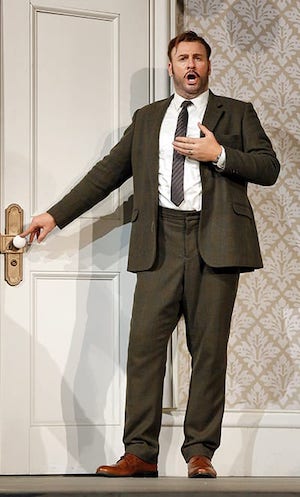
Whatever their deficits, pandemic-era streaming performances have a way of stripping away the formal niceties of the concert hall.
In “I Left My Aria in San Francisco,” a recital-cum-conversation by baritone Lucas Meachem and his accompanist wife, Irina Meachem, listeners got an up-close and personal feel for the couple. We learned how and where they met — in Minneapolis, where this program was mounted. We heard about Lucas’s penchant for singing and humming around the house. And then there was news of a diaper change of the couple’s one-year-old child, Cash. It’s not the kind of patter normally delivered at the Herbst Theatre or War Memorial Opera House.
Relaxed as the atmosphere may have seemed — the singer kept stepping out of the frame between numbers to sip tea, while his wife, dressed in black-and-white checked pants that rhymed with her husband’s shirt, did most of the talking to the camera — the recital captured a sense of genuine operatic dynamism that came across powerfully through the screen.

In seven arias and one encore, this masterly baritone confirmed what San Francisco Opera audiences have known for 15 years. Meachem is a vocalist of consummate artistry, technical command, expressive range, and that alchemical ability to embody character, emotion, and dramatic flow while singing alone in street clothes.
That’s challenging enough to do in the presence of a live audience. Accomplishing it under these circumstances, with only a few technicians in the room, was a double degree-of-difficulty feat. The setting of the Mill City Museum, with the ruins of an old flour mill visible through large windows behind the performers, supplied a fitting backdrop. Here, from an abandoned realm, came a vital pulse of musical life.
The 50-minute performance inaugurated a new Merola Opera Program Virtual Recital Series on Sept. 27.

The program opened with “Bella siccome un angelo” (Beautiful as an angel), from Donizetti’s Don Pasquale. Meachem got to flash his bel canto chops and lofty, lingering high right away, in his character’s wonderfully seductive sell-job to an old man. The insinuating tone carried a lubricious pleasure in appealing to another man’s sexual vanity.
“Hai già vinta la causa” (You have already won the case) from Mozart’s Le Nozze di Figaro came next. Meachem made his Count Almaviva at once proud, calculating, and determined. The surges of thought and feeling, heightened by the “high version” of the aria Meachem sang, made this an exciting and propulsive highlight. Telling hand gestures and even several pointedly drawn breaths added to the unified effect.
That was the first half of Mozart one-two punch. With “Deh, vieni alla finestra” (Oh, come to the window) from Don Giovanni, Meachem gave a mini-master class in shaping an aria.
The Don’s 6/8 serenade began in a rippling faux innocence that ripened to a practiced seducer’s magnetizing, husky-voiced intimacies. In a smooth segue, it prompted Irina to recall her first encounter with Lucas, in 2013, at Mill City Summer Opera. “I thought he was a stagehand.” His technique? He showed her his fishing pictures. Their first real date didn’t happen for another year.
Meachem was raffish as he rattled through Mercutio’s speed-singing pep talk to Romeo in the “Queen Mab” aria from Gounod’s Roméo et Juliette. Then Meachem paused to recount the night when he, as an Adler Fellow in 2005, was summoned to sing the title role he was covering for San Francisco Opera in Tchaikovsky’s Eugene Onegin. It’s a great story, complete with granular detail. He remembered eating spaghetti and meatballs in a Civic Center restaurant when he got the summons to the Opera House two hours before curtain.
As if channeling that thrilling debut, Meachem was superb here in Onegin’s aria in which he explains that his feelings for a love-smitten woman are not reciprocated. From long, probing lines to tender phrase endings, this was singing full of empathic feeling. Meachem’s voice, by turns brawny, showy, and seductive in earlier selections, took on a mature, self-knowing translucency here. In the space of a single aria, he made Onegin a complex, fully formed character.
Moving, in a more overtly emotional way, was “Mein Sehnen, mein Wähnen” (Pierrot’s Tanzlied — My longing, my imagination) from Korngold’s Die Tote Stadt. Once again the singer’s high notes and gorgeous tone shone out in this bittersweet aria, which ended on a reverberant fading pianissimo.
The regular program ended with “Love Let the Wind Cry,” by Undine Smith Moore (1904–1989), a black woman composer the Meachems champion. The baritone gave this big-boned number a potent, committed performance that bordered on overstating the case.
“I Left My Aria” suffered from a few technical glitches. The piano got lost in the shuffle now and then. But with a program as absorbing as this, listeners had plenty of reason to stay close to their screens.
The encore was aimed straight at Meachem’s artistic home town. “I Left My Heart in San Francisco” may be an obvious choice — the program’s title all but required it. But now that Tony Bennett can’t be heard singing after a Giants win, the sentimentality made for a wistful send-off.




